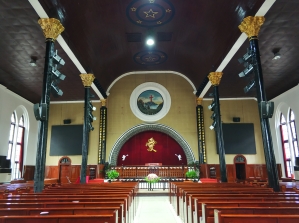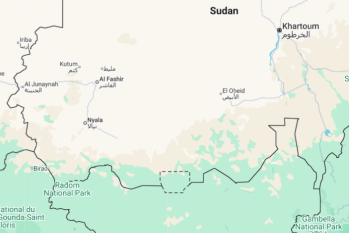
New regulations for “religious activity venues” in China advance officials’ desire to replace spiritual instruction with Chinese Communist Party (CCP) political teaching, rights experts say.
The Administrative Measures for Religious Activity Venues announced on Sept. 1 further the CCP’s policies of “Sinicization,” said Olivia Enos, a senior fellow at the Hudson Institute who specializes in human rights and national security.
“Sinicization requires that religious practice conforms to the CCP’s goals and ends,” Enos told Christian Daily International by email. “These latest measures do just that by requiring what is preached from the pulpit to reflect the will of the CCP.”
The state of religious freedom in China is already dire, but the new regulations continue to heighten persecution of persons of all faiths, she said.
“It is not possible to worship both the CCP and God at the same time, and the CCP knows that, so if it can replace religious teaching with political teaching, the Party knows that it wins out in the end,” Enos said.
The latest in a series of measures implemented since 2018 in President Xi Jinping’s program to Sinicize religion, the new regulations require CCP propaganda to be included in sermons and formation of groups to study CCP documents, rights advocates said. Worship venues that do not comply with the requirements face liquidation, according to online religious rights magazine Bitter Winter.
Directed at the five recognized religious groups, including the government-controlled Protestant (Three-Self Patriotic Movement, or TSPM) and Catholic churches, the new measures state that they must “adhere to the direction of Sinicization of China’s religions.”
“Places of religious activity shall uphold the leadership of the CCP and the socialist system, thoroughly implement Xi Jinping’s ideology of socialism with Chinese characteristics for the new era, abide by the Constitution, laws, rules and regulations and relevant provisions on the management of religious affairs, practice core socialist values…and safeguard the unity of the country, national unity, religious harmony and social stability,” Article 3 states.
Likewise, Article 30 orders the requisite “management organization” of a religious body to “unite and educate religious citizens to love the motherland, support the leadership of the CCP, practice socialist core values[and] adhere to the direction of the Sinicization of China’s religions.”
While “proselytizing” and organized religious education for children have long been banned in China, “since President Xi Jinping came to power in 2012, local officials have been less likely to overlook such activities,” an Aug. 30 Pew Rearch Center report noted. While aimed at venues of the five approved religions – Buddhism, Islam and Taoism, along with Protestantism and Catholicism – the new measures provide further grounds for prosecution of unregistered churches, rights advocates said.
The directives assume unregistered churches are illegal, repeatedly making reference to them as comprising illegal personnel involved in illegal gatherings and using illegal property donations, a Chinese human rights attorney now residing in the United States, Chen Jiangang, told Voice of America on Aug. 31.
Article 71 stipulates, “If a place of religious activity is established without authorization, it shall be punished by the Department of Religious Affairs in conjunction with the relevant departments in accordance with the provisions of the Regulations on Religious Affairs or relevant laws and regulations.”
Article 72 addresses violations by church leaders, stating, “Any member of the management organization of a place of religious activity who violates the provisions of these measures shall be ordered by the registration authority to make corrections; if the circumstances are serious, the place shall be ordered to be closed, and if he or she is a member of the religious clergy, he or she shall be punished in accordance with the provisions of the Regulations on Religious Affairs.”
Chen reportedly said the measures mark the first time that authorities demand religious personnel adhere to “Xi Jinping Thought on Socialism with Chinese Characteristics for a New Era,” the ideology Xi introduced at the 19th National Congress of the CCP in 2017 that was subsequently incorporated into the CCP Constitution. In March 2018, China amended the preamble of China’s constitution to include mention of Xi Jinping Thought.
Thus the new measures not only increase state controls but demand insertion of state ideology in sermons and teaching. Article 36 decrees, “Places of religious activity shall establish a study system, and regularly organize the personnel of the place to study the guidelines and policies of the CCP, national laws and regulations, Chinese excellent traditional culture, religious knowledge, and so on.”
Article 39 stipulates that “the content of sermons and teachings shall be suitable for the characteristics of China’s national conditions and the characteristics of the times, and shall be integrated with the excellent traditional Chinese culture and reflect the core socialist values.”
China defends the measures as protecting freedom of religious belief “in accordance with the law.” The measures “help further improve the standardization and institutionalization of the administration of venues for religious activities and safeguard the legitimate rights and interests of venues for religious activities and believers,” Chinese Embassy Spokesperson Liu Pengyu told VOA Mandarin by email. “Chinese government protects citizens’ freedom of religious belief in accordance with the law. People of all ethnic groups in China are fully entitled to the freedom of religious belief as prescribed by law...We urge relevant parties to stop using the so-called religious issues to meddle in China’s internal affairs.”
In other provisions of the Sept. 1 measures, religious bodies cannot organize or engage in religious activities outside their premises without authorization under Article 42, and charitable work is controlled under Article 43, which states that those providing such public welfare must “report them to the local religious groups and registration authorities for the record.”
Article 29, Bitter Winter notes, states that members of management organizations of religious venues will be promptly removed if one of 10 prohibitions are violated, including “Participating in illegal[i.e., unregistered]religious organizations, engaging in illegal religious activities, or facilitating illegal religious activities,” and, “Organizing or hosting unauthorized religious activities held outside the place of religious activity.”
The measures also prohibit the building of “large open-air religious statues outside of temples and churches.” This prohibition also applies to private citizens and donors.
Each of the administrative measures the CCP has introduced since the Feb. 1, 2018 Religious Affairs Regulations came into force have limited the space in which churches can legally operate, Elizabeth Kendal of the Religious Liberty Prayer Bulletin notes.
“To be legal, religious activity must be exercised within strict CCP parameters and under the oversight of the CCP’s religious affairs departments,” Kendal wrote in the Aug. 16 RLPB. “Christian leaders who protested ended up in prison; their church properties shuttered and demolished; their church members persecuted.”
Among the restrictive measures introduced since the 2018 regulations came into effect was the May 1, 2021, Administrative Measures for Clergy, limiting religious teaching to those registered in the national database of CCP-approved clergy; the March 1, 2022 Measures on the Administration of Internet Religious Information Services, limiting religious information over the internet – crucial for church services, Bible studies and leadership trainings during COVID-19 lockdowns – to those who hold an Internet Religious Information Services License; and the June 1, 2022, Measures for the Financial Management of Religious Sites, eliminating the right to determine how offerings can be spent by putting all church finances in the hands of the Communist Party’s United Front Work Department and Ministry of Finance.
Historically, the effects on churches of new legislation have not been felt immediately and have varied among regions. It remains to be seen how churches will be affected by the new guidelines and how they will respond. But Kendal sounded an alarm regarding the Sept. 1 regulations, concluding, “These measures will not merely further limit the space in which Bible-believing, gospel-focused individuals can operate, they will effectively obliterate it.”





